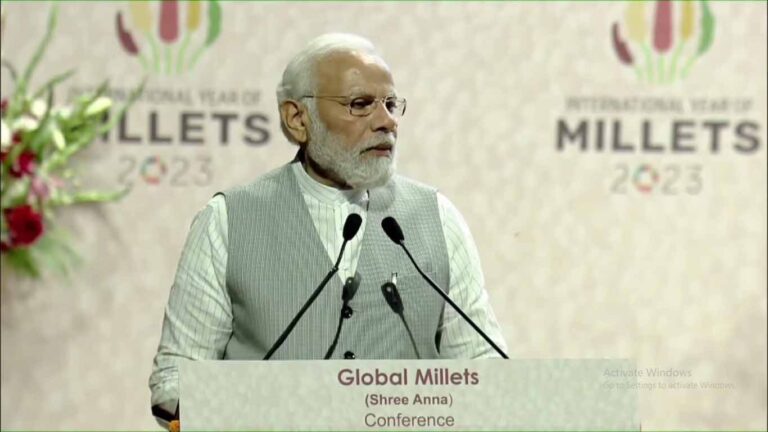On the stage of the ‘Global Millet Conference 2023’ organised in New Delhi on Saturday, March 18th, foreign delegates lauded India’s leading role in identifying and promoting millet to address the potential global food crisis amid the peril of climate change.
Indian Prime Minister Narendra Modi, Commerce Minister Piyush Goyal, Agriculture Minister Narendra Singh Tomar and Health Minister Mansukh Mandaviya participated in the Global Millet Conference. Apart from them, representatives of foreign agricultural ministries (Gambia, Sri Lanka, Maldives, Suriname, Sudan, and Mauritius) also participated in the conference.
The Indian Agricultural Research Institute (ICAR) alongside various international agricultural centres had also their representatives participate in the conference either in person or virtually.
At the beginning of the programme, Agriculture Minister Tomar thanked the representatives of the foreign agriculture ministries for joining the conference. During his speech, Tomar praised Modi and said that India continues to spearhead the movement of promoting millet at the international level and recognising it as a crucial food grain to combat climate change and the food crisis under his leadership.
Among the foreign dignitaries, Ethiopian President Sahle-Work Zewde and Guyanese President Mohamed Irfaan Ali said through video messages that addressing climate change and the food crisis is a challenge before the world’s growing population.
They also said that millet is a crop that could help the world overcome this peril as the crop can be grown in an adverse environment and with a limited water supply. They eulogised India’s effort led by Modi to promote millet as an alternative food crop.
Later, Modi launched a postal stamp and a coin acknowledging the significant contributions of millet farmers to agriculture. He said that the United Nations (UN) had recognised 2023 as the International Millet Year due to India’s continuous campaign and efforts. He also averred that millet was termed “Shree Anna” in the latest Union Budget for its nutritional value and health benefits.
Pointing out the production of millet in adverse conditions, Modi said that 25m Indian farmers are involved in millet cultivation, and almost all of them are marginal farmers. He kept on saying that an increase in millet production would not only address the food crisis triggered by climate change but also increase the income of these small farmers.
While speaking about the benefits of millet, he also said that millet could be cultivated chemical-free, thereby alleviating environmental pollution.
He added that the increase in the income of farmers who are engaged in millet cultivation would improve the rural economy. He opined that the involvement of various Self-Help Groups (SHGs) in millet cultivation would increase the packaging and selling of millet products, thereby strengthening the supply chain system and increasing employment.
Furthermore, referring to India’s G20 presidency, Modi said that India strove to promote millet on the international stage keeping the motto “One World, One Family, One Future” in mind as the world needs to deal with the menace of climate change and food crisis as a closely-knit family.
He urged the world to develop a robust structure to strengthen millet farming globally so that the entire world could work intimately.

